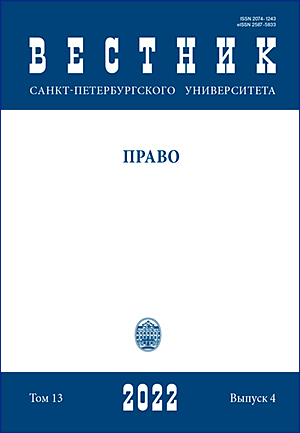The notion of voluntariness in the notes to Articles 291 and 291(1) of the Criminal Code of the Russian Federation
DOI:
https://doi.org/10.21638/spbu14.2022.404Abstract
The article analyzes the notion of voluntariness used by the legislator in the notes to Art. 291 of the Criminal Code of the Russian Federation “Giving a bribe” and Art. 291(1) of the Criminal Code of the Russian Federation “Mediation in bribery”. The use of this category in the practice of law enforcement agencies is not uniform, as evidenced by the extensive jurisprudence analyzed in the article. The main problem lies in the contradictory assessment of the fact that the accused is aware of the fact that the preliminary investigation authorities are aware of his participation in bribery or mediation in bribery. In most cases the courts ignore this circumstance and attach legal significance not to the awareness of the accused himself, but to the awareness of the preliminary investigation bodies that a person has committed a crime. As a result, having established that the subject was exposed as a result of operational-search and (or) investigative measures, regardless of whether he knows about this fact, the courts refuse to apply the notes to Art. 291 and 291(1) of the Criminal Code. According to the authors, when assessing the voluntariness of a person’s message about the commission of a crime, two interrelated, but not identical circumstances should be assessed: a volitional criterion that characterizes the desire and will of the subject, and an intellectual criterion that determines the person’s ability to be aware of what is happening to him. The article states that the communication by a person about a crime committed to a body that has the right to initiate a criminal case will be voluntary if the person does so of his own free will and believes that the authority does not know about his participation in the crime, even if in reality it is not so.
Keywords:
bribe, receiving a bribe, mediation in bribery, report on a committed crime, voluntariness, voluntary reporting of a crime, active remorse, exemption from criminal liability, special grounds for exemption from crime
Downloads
References
Downloads
Published
How to Cite
Issue
Section
License
Articles of "Vestnik of Saint Petersburg University. Law" are open access distributed under the terms of the License Agreement with Saint Petersburg State University, which permits to the authors unrestricted distribution and self-archiving free of charge.






